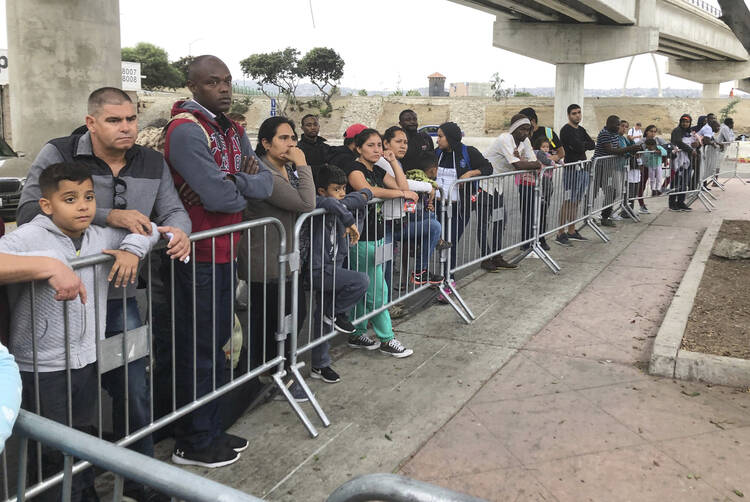Dear Cara, Mariah and Michaela:
I have spent recent days holding tight to thoughts of you three, my heart breaking as I meet families fractured and in turmoil, yet clinging to the hope of the American dream.
I am about to fly home from Tijuana after meeting with asylum seekers and their lawyers at the U.S.-Mexico border. The exhaustion, the filth and the fear are all palpable as I walk through the makeshift shelters for migrants. Parents and children know their lives are at stake, and families are still being separated in other ways, despite the Trump administration’s formal end to the “zero tolerance” policy of taking children away from all parents who enter the country without documentation. And there is no guarantee of family reunification, a grim reality confirmed by a recent Department of Homeland Security report that found the Trump administration had “no way to link” separated children with their parents.
Our immigration system is cruel and capricious, a contrast to Pope Francis’ call to “tear down walls and build bridges.”
Our immigration system is cruel and capricious, a contrast to Pope Francis’ call to “tear down walls and build bridges.” These are a few of the heart-wrenching stories I learned firsthand, either from those who experienced them or from their lawyers, on this trip organized by the social action agency Revolve Impact:
- A little boy from Central America watched both his parents murdered, execution-style. Immigration advocates told us that when his grandmother brought him over the border, U.S. authorities took the traumatized child away from his abuela, placing him in child protective services instead. His grandmother did not fit the Trump administration’s definition of “family,” so this separation was, in their minds, legal.
- A transgender woman whose life had been threatened by an El Salvador gang made the treacherous journey through Guatemala, across Mexico and up to the California border. She was ecstatic the day she finally crossed into the United States and filed for asylum. But an immigration officer denied her claim and deported her to San Salvador, where, within hours of arrival, she was murdered by the gang.
- The mother of a 6-month-old baby, sure that she and the child would be separated, stopped breastfeeding in advance of claiming asylum to ease the transition.
- A young man who crossed the border legally was apprehended by Customs and Border Patrol and placed in the San Ysidro Detention Facility. Like most C.B.P. jails along the border, San Ysidro is notorious for holding asylum seekers in sub-basement facilities called hieleras (“ice boxes”) because of their freezing temperatures. He died that same night from exposure.
Yet in the midst of all this suffering, there is also incredible heroism. Pro bono attorneys help reduce time in detention and monitor human rights abuses along the border, filing petitions and using bond funds to free mothers, fathers and children from cages, even as they experience harassment from immigration officials. These men and women are engaging in strategic litigation to stop the use of “metering,” which severely limits the number of asylum-seekers allowed to present their cases on any given each day at certain ports of entry.
These attorneys are also holding ICE accountable for detention violations, including forced labor at privately run detention centers with government contracts—where people who have broken no law are coerced into working a full day’s labor for less than a dollar’s wages. And they are enforcing the Americans with Disabilities Act, citing medical neglect and failure to provide the most rudimentary bathroom facilities for those who are wheelchair-bound.
Amazing lawyers have reunified many families, but those reunifications are not always as sweet as one might think.
Amazing lawyers have reunified many families, but those reunifications are not always as sweet as one might think. Many indigenous children forget their native tongues after they are taken from their families and must speak Spanish or English instead. This stymies desperate parents trying to communicate with their own children—little ones who may have been told during their separations that they were purposefully abandoned.
There is no legal requirement for family separations; the purported justification by the Trump administration was to deter asylum seekers from coming to the United States in the first place. Yet deterrence fails. People are willing to endure the cruelty of the Trump policies because there is no other option but to return home to certain death.
Remember that we are reaping the whirlwind of decades of meddling in Central America. U.S. multinational corporations, including United Fruit, stripped people of their ancestral lands, stripmined the mountains and poisoned water supplies. The U.S. government, often in the service of business interests, has a long history of backing dictators who repressed popular movements and undermined democracy. The international criminal gang MS-13 started in Los Angeles, and the United States exported those gangsters to countries that did not have the resources to control them. Finally, our demand for drugs has enabled gangs and drug lords in the region.
I realize that the United States cannot grant asylum to every person who seeks it, but this trip has deepened my conviction that we should treat each person with dignity and uphold our values as a nation of immigrants. I will not forget the faces I have seen here.
I love you, and can’t wait to see you soon,
Momma










